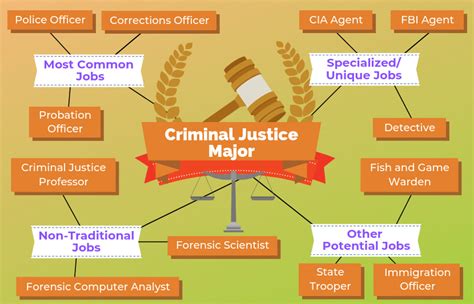Criminal justice is a broad field that encompasses a wide range of careers, from law enforcement and corrections to victim advocacy and criminal justice policy. According to the Bureau of Labor Statistics (BLS), there were over 2.5 million criminal justice jobs in the United States in 2020. This number is expected to grow by 5% over the next decade, faster than the average for all occupations.

Law Enforcement
Law enforcement officers are responsible for enforcing the law and protecting the public. They may work for local, state, or federal law enforcement agencies. Some of the duties of law enforcement officers include:
- Patrolling neighborhoods and responding to calls for service
- Investigating crimes
- Arresting suspects
- Testifying in court
Corrections
Correctional officers are responsible for supervising and rehabilitating inmates in prisons, jails, and other correctional facilities. Some of the duties of correctional officers include:
- Maintaining order and security in correctional facilities
- Counseling inmates
- Providing inmates with food, clothing, and other necessities
- Preparing inmates for release
Victim Advocacy
Victim advocates provide support and assistance to victims of crime. They may work for non-profit organizations, government agencies, or law enforcement agencies. Some of the duties of victim advocates include:
- Providing emotional support to victims of crime
- Advocating for victims’ rights
- Helping victims navigate the criminal justice system
- Referring victims to other resources
Criminal Justice Policy
Criminal justice policy makers develop and implement policies that affect the criminal justice system. They may work for government agencies, think tanks, or advocacy organizations. Some of the duties of criminal justice policy makers include:
- Conducting research on criminal justice issues
- Developing and implementing criminal justice policies
- Evaluating the effectiveness of criminal justice policies
- Advocating for changes to the criminal justice system
Education and Training
Most criminal justice majors earn a bachelor’s degree in criminal justice or a related field. Some schools also offer master’s and doctoral degrees in criminal justice. In addition to coursework, many criminal justice majors complete internships with law enforcement agencies, correctional facilities, or victim advocacy organizations.
Career Outlook
The job outlook for criminal justice majors is expected to be good over the next decade. The BLS projects that the number of criminal justice jobs will grow by 5% over the next decade, faster than the average for all occupations. This growth is expected to be driven by the need to replace retiring workers and by the increasing demand for law enforcement and correctional officers.
Salary
The median annual salary for criminal justice majors is $59,660. The lowest 10% of earners earn less than $30,340, and the highest 10% of earners earn more than $114,460.
Benefits of a Criminal Justice Degree
There are many benefits to earning a criminal justice degree. Some of the benefits include:
- Job security: The job outlook for criminal justice majors is expected to be good over the next decade. This is because there is a high demand for law enforcement and correctional officers.
- Competitive salary: The median annual salary for criminal justice majors is $59,660. This is higher than the average salary for all occupations.
- Opportunities for advancement: There are many opportunities for advancement in the criminal justice field. For example, law enforcement officers can promote to the rank of sergeant, lieutenant, or captain. Correctional officers can promote to the rank of sergeant, lieutenant, or captain. Victim advocates can promote to the rank of supervisor or director. Criminal justice policy makers can promote to the rank of manager or director.
- Making a difference: Criminal justice majors can make a difference in the world by helping to keep communities safe and by assisting victims of crime.
Tips for Success in Criminal Justice
Here are a few tips for success in criminal justice:
- Get a good education: The first step to success in criminal justice is to get a good education. This means earning a bachelor’s degree in criminal justice or a related field. In addition to coursework, you should also complete internships with law enforcement agencies, correctional facilities, or victim advocacy organizations.
- Network with professionals: Networking is important in any field, and criminal justice is no exception. Attend industry events, meet with professionals in the field, and get involved with professional organizations.
- Be prepared to work hard: Criminal justice is a demanding field. You will need to be prepared to work long hours and deal with difficult situations. However, the rewards of a career in criminal justice can be great.
If you are interested in a career in criminal justice, then you should consider earning a bachelor’s degree in criminal justice or a related field. With a good education and a strong work ethic, you can achieve success in this rewarding field.
